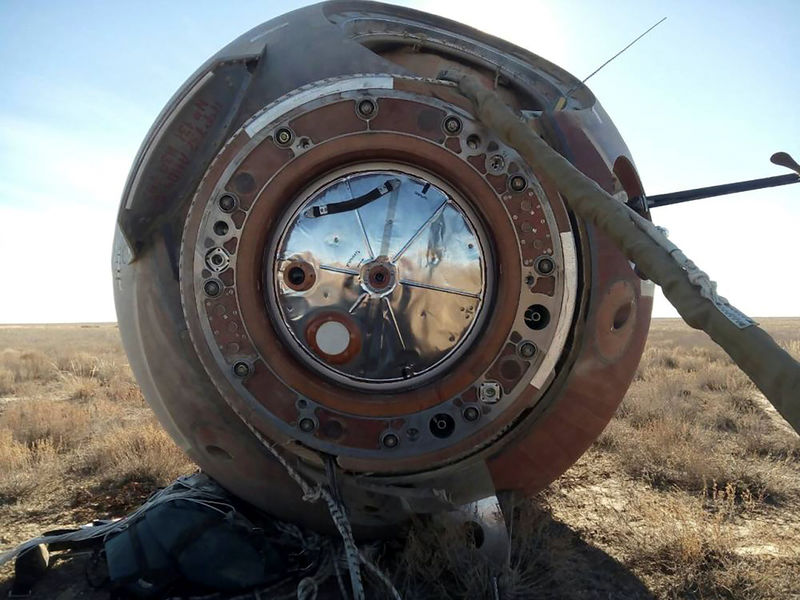By Shamil Zhumatov
BAIKONUR COSMODROME, Kazakhstan (Reuters) - The two-man U.S.-Russian crew of a Soyuz spacecraft en route to the International Space Station survived a dramatic emergency landing in Kazakhstan on Thursday when their rocket failed in mid-air.
U.S. astronaut Nick Hague and Russian cosmonaut Alexei Ovchinin landed safely without harm and rescue crews who raced to locate them on the Kazakh steppe quickly linked up with them, NASA, the U.S. space agency, and Russia's Roscosmos said.
The emergency occurred as the first and second stages of a booster rocket separated shortly after launch from Kazakhstan's Soviet-era cosmodrome of Baikonur.
The Soyuz capsule carrying the two men separated from the malfunctioning rocket and made what NASA called a steep ballistic descent to Earth with parachutes helping slow its speed. A cloud of sand billowed up as the capsule came down on the desert steppe.
Rescue crews then raced to the scene to retrieve them with reports of paratroopers parachuting to their landing spot.
Footage from inside the Soyuz showed the two men being shaken around at the moment the failure occurred, with their arms and legs flailing. Ovchinin, the Russian cosmonaut, can be heard saying: "That was a quick flight."
Photographs later released by Roscosmos after the rescue showed the two astronauts smiling and relaxing on sofas at a town near their landing site as they underwent medical tests. Interfax said they would spend one night in hospital.
Moscow immediately suspended all manned space launches, the RIA news agency reported, while Roscosmos chief Dmitry Rogozin said he had ordered a state commission to be set up to investigate what had gone wrong.
Interfax quoted a source as saying the crash meant the three people now aboard the space station -- a German, a Russian and an American -- would be stuck there at least until January. Unmanned launches of Soyuz rockets might also be suspended, Interfax said.
Russian rockets have been the only means of bringing crew to the International Space Station since the United States retired its Space Shuttle program in 2011, although NASA has announced plans for a test flight carrying two astronauts on a SpaceX commercial rocket in April next year.
Thursday's accident was the first serious launch problem experienced by a manned Soyuz space mission since 1983, when the crew narrowly escaped before an explosion on the launchpad.
Jim Bridenstine, NASA's administrator who was in Kazakhstan to witness Thursday's launch, said in a statement that the failure had been caused by an anomaly with the rocket's booster.
"A thorough investigation into the cause of the incident will be conducted," he said, saying the safety of the crew was the utmost priority for NASA.
U.S. SPACE PLANS
Kremlin spokesman Dmitry Peskov told reporters that the most important thing was that the two men were alive.
"Rescue services have been working since the first second of the accident," Rogozin wrote on Twitter. "The emergency rescue systems of the MS-Soyuz spacecraft worked smoothly. The crew has been saved."
A Russian space industry source was cited by the Interfax news agency as saying that there was enough food onboard the space station to last until April of next year.
The next re-supply run was meant to take place on Oct. 31, the source was quoted as saying, but that was now in doubt since the Progress supply ship was propelled by the same kind of rocket used in Thursday's incident.
Questions are now likely to be asked about Russia's space program. In August, a hole appeared in a Soyuz capsule already docked to the ISS which caused a brief loss of air pressure and had to be patched. Rogozin has said it could have been "sabotage".
And in November last year, Roscosmos lost contact with a newly-launched weather satellite - the Meteor-M - after it blasted off from Russia’s new Vostochny cosmodrome in the Far East.
Rogozin said at the time that the problem with the launch of the 2.6 billion-rouble ($39.02 million) satellite had been due to an embarrassing programming error.
($1 = 66.6315 roubles)
